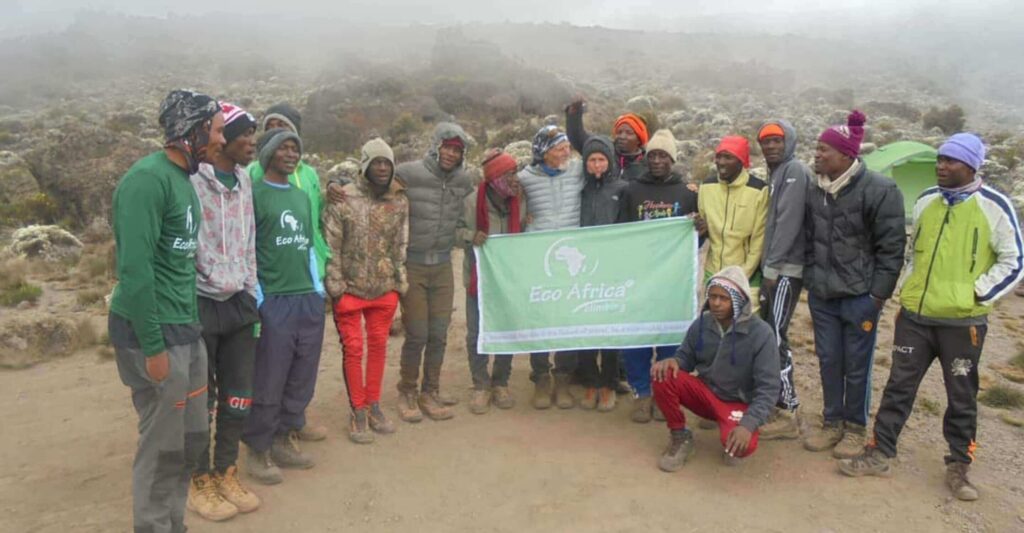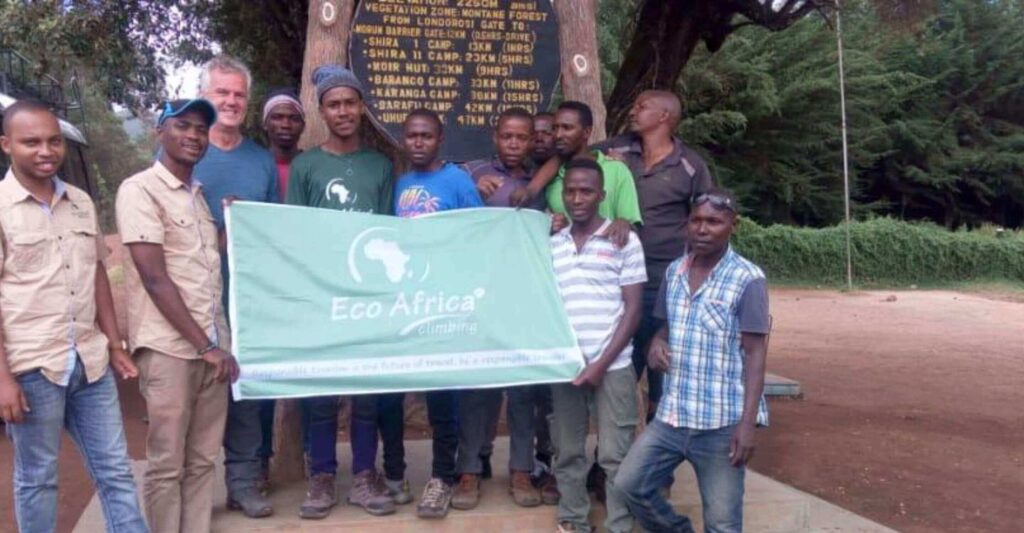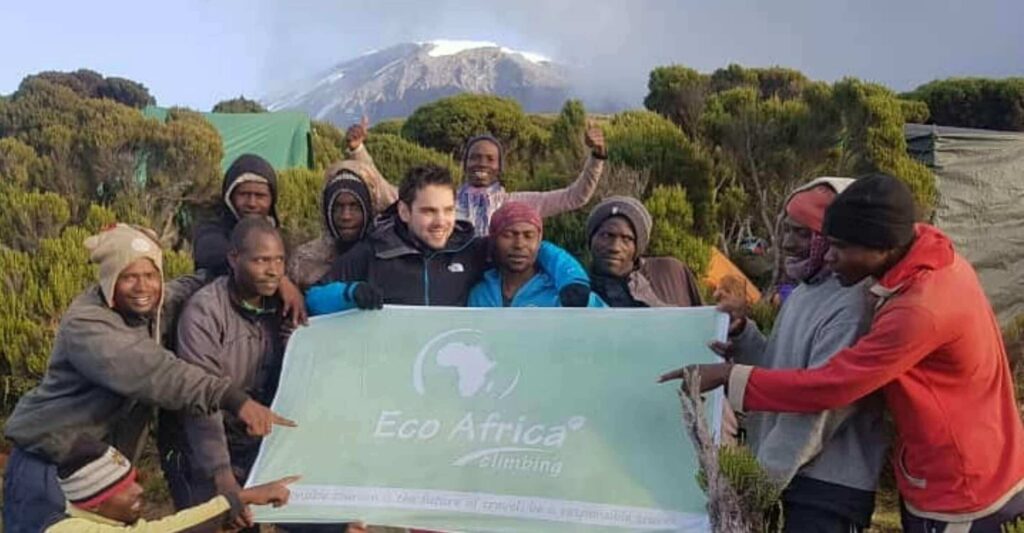HOW MANY DAYS TO CLIMB KILIMANJARO
Many people always ask the ultimate question regarding the HOW MANY DAYS TO CLIMB KILIMANJARO?
People planning to climb Mount Kilimanjaro frequently ask how long it takes to climb Kilimanjaro?
For an ordinary person with an average fitness level, it takes seven to nine days to reach the summit of Mount Kilimanjaro. Still, for the experienced climber, it may take from 5 days to 7 days as this depends on what route they have taken.
Kilimanjaro routes take about five to nine days on the longer routes to reach Mount Kilimanjaro Summit Uhuru peak and descend to the Finish point. The more days you spend on the mountain acclimatizing, the better your chances of getting to the top. The climbers who spend only 5 days have the lowest Summit success rate.
Climbers who spend 8 or 9 days have a much better chance of summiting. Read more about the best routes to climb Kilimanjaro.
Eco-Africa Climbing, we encourage our customers to take 7-9 day routes for the best chance of success and the lowest risk of altitude sickness.
Acclimatization Factor affecting how long it takes to climb Kilimanjaro
Kilimanjaro is a “walk-up” mountain, meaning no technical climbing is involved. How long it takes to reach the summit is primarily dictated by how well you can acclimate to the lack of oxygen.
The main reason why climbers fail to reach the summit of Kilimanjaro is simply that they have not acclimatized to the altitude.
How badly do you want to get to the summit? If you’re serious about completing the climb, acclimatization is the main factor standing in your way.
The good news is that going slow and taking your time allows your body to adapt to the lack of oxygen gradually.
The more days you spend on the mountain acclimatizing, the better your chances of reaching the top. Climbers who spend only 5 days on Kilimanjaro have the lowest success rate, while those who spend 8 or 9 days have a much better chance of standing on the Roof of Africa.
According to The Wilderness Medical Society, the Practice Guidelines for the Prevention of Acute Altitude Illness suggested that controlling the ascent rate in terms of the number of meters gained each day is a “highly effective means of preventing altitude illness.”
A slow and steady ascent gives your body time to adjust to the altitude, and while physical fitness does not seem to affect how well you acclimatize, you’ll build in enough time for rest and recovery after the day’s hiking.
It’s challenging to get up-to-date data from the Kilimanjaro National Park, but in 2006 estimates of the success rate based on the number of days spent on the mountain were clear. At that time:
- 27% of those who opted for the 5-day trek made it to the summit,
- 85% of trekkers who spent 8 days on their climb were successful.
Those numbers have undoubtedly improved since then, thanks to better guides, improved gear, and a better understanding of hiking the trail successfully. But, they give you an indication of the importance of taking your time on the mountain.
Being very fit does not correlate with an increased ability to acclimatize. Being physically fit will make trekking easier reduce fatigue and stress, but it won’t help you acclimatize.
According to Dr. Hackett from the Institute for Altitude Medicine, physical fitness will give you no protection from altitude sickness. Many young, fit people will sometimes push through the discomfort, ignoring essential symptoms.
How long does it take to climb Mount Kilimanjaro on each route?
There are seven different routes you can use to climb Mount Kilimanjaro.
The shortest possible way to the summit is by the Marangu or the Umbwe Route. These routes can be completed in 5 days (but we don’t recommend it for most hikers).
The longer treks, Lemosho, Machame, Rongai, or Northern Circuit routes take 7-10 days.
You should take the longer route to give your body time to acclimatize to the altitude, but there are other considerations.
Unless you are very fit, covering the same amount of ground in a shorter time frame can increase your chances of fatigue and injury – and compromise your enjoyment of the environment.
Eco-Africa Climbing, we encourage our customers to take 7-9 day routes for the best chance of success and the lowest risk of altitude sickness.
Each route is varied in the duration of the mountain, the types of accommodation, the level of difficulty, the kind of scenery, and other factors.
The table below lists each route, sorted by the number of days usually taken on each route.
ROUTE | NUMBER OF DAYS | ROUTE LENGTH | SUCCESSFUL SUMMITING RATE |
MARANGU | 5 |
64 KM | 45% |
6 | 55% | ||
UMBWE | 6 |
53 KM | 45% |
7 | 55% | ||
RONGAI | 6 |
65 KM | 65% |
7 | 80% | ||
SHIRA | 6 |
70 KM | 55% |
7 | 65% | ||
MACHAME | 6 |
63 KM | 53% |
7 | 80% | ||
LEMOSHO | 7 |
74 KM | 85% |
8 | 90% | ||
NORTHERN CIRCUIT | 8 |
98 KM | 85% |
9 | 95% |
Marangu Route
Marangu was the first route used by the climbers for Kilimanjaro climbing expeditions. It is the only route where overnight stays are in huts, and for that reason, it is often chosen by low-profile Kilimanjaro operators (there is no need to purchase expensive equipment such as tents or sleeping bags. This route has one of the lowest numbers of climbers who successfully reach Uhuru Peak.
5-day Marangu and 6-day Marangu climbing are the numbers of days allowed on this route.
Though the 6-day Kilimanjaro trekking option provides the “trek high – sleep low” profile, daily altitude gain is still too high for many climbers to adapt smoothly to the increasing altitudes.
Umbwe Route
Umbwe Route is a choice for hardened mountaineering experts with many climbs under their belt. The route provides the fastest, yet the steepest, way to Uhuru Peak with poor acclimatization transition.
There are no reliable success rate statistics on Umbwe route Kilimanjaro expeditions. What is known is that the majority of experienced mountaineers with prior acclimatization mainly reach Peak Uhuru, while the Umbwe summiting rate among beginners is very low.
6-day Umbwe and 7-day Umbwe climbing are the number of days allowed on this route.
Rongai Route
Rongai Route is the only one that starts in the Northern foothills of Mount Kilimanjaro.
6-day Rongai and 7-day Rongai climbing are the number of days allowed on this route.
Shira Route
The Shira Route is a path approaching Kilimanjaro from the west and is nearly identical to the Lemosho route. Shira was the original route, and Lemosho is the improved variation. While Lemosho starts at Londorossi Gate and treks through the rain forest to Shira 1 Camp, the Shira route bypasses this walk by using a vehicle to transport climbers to Shira Gate, located near the Shira Ridge. On the first day on the mountain, climbers begin their hike from 11,800 feet (3,600 m) and spend their first night at the same elevation at Shira 1 Camp.
6-day Shira and 7-day Shira climbing numbers are the number of days allowed on this route.
Machame Route
The most popular Kilimanjaro climbing route, Machame, has over 50% of all climbers. If you choose Machame for your Kilimanjaro adventure, it will never be a mistake. This route has a great ‘walk-high sleep low trekking style, resulting in a safe acclimatization transition.
6-day Machame and 7-day Machame climbing are the number of days allowed on this route.
Lemosho Route
Lemosho route is one of the most scenic and hence the least crowded.
It starts on the south-western slopes of Kilimanjaro. Lemosho features nearly intimate trekking experiences with Kilimanjaro, ultimately converging with Machame in Shira 2 Camp.
Lemosho is one of the few routes having perfect ‘walk high-sleep low’ climbing throughout.
The table above shows somewhat higher successful summiting success rates.
7-day Lemosho and 8-day Lemosho climbing are the number of days allowed on this route.
Northern Circuit Route
The northern circuit route is the longest and the most physically demanding on Mount Kilimanjaro; it has an excellent acclimatization transition. It is the safest climbing option with picturesque landscapes and captivating wildlife. With Lemosho Route, it is the least visited trek, which may be necessary for those seeking seclusion and privacy. Northern Circuit has an 85% record of successful climbs.
8-day Northern and 9-day Northern climbing are the number of days allowed on this route.
Eco-Africa Climbing, we recommend you take 7 days Machame route, 7 days Lemosho Route, and 9 Days Northern Circuit Route because they have a higher chance of acclimatization and have a good climb higher sleep lower profile.
Our Top Recommended Ethical Kilimanjaro Climbs
Ethical Kilimanjaro via Northern Circuit Route 9 Days
The Northern Circuit route is one of the best routes on Kilimanjaro.The route approaches Mount Kilimanjaro from the west….
From USD $3250
Ethical Kilimanjaro via Lemosho Route 8 Days
The Lemosho route is one of the newer routes on the mountain and a superb choice for your climb, It is our preferred route…
From USD $2950
Ethical Kilimanjaro via Machame Route 7 Days
Machame (“Whiskey”) Route is also known as the “Whiskey” route, the Machame route is now the most popular route on the …
From USD $2650
How long Does it take to descend Kilimanjaro?
It takes two days to descend Kilimanjaro from the Uhuru Peak Summit to the Finish point. The descent can take up to 5hrs to reach Camp overnight and the following day 4hrs to 6 hours, depending on the route and climber experience.
Longer Routes are a Better Choice
Many to-be people often choose 5-day or 6-day climb to reduce the price. However, because the Kilimanjaro climbing adventure is not cheap (although, in terms of trekking one of the Seven Summits, it is considerably affordable!), the price difference between a 6 or 7-day adventure is not significant. Consider instead causing unnecessary stress to your body or increasing your chances of reaching Uhuru Peak and enjoying the trek.
Taking a shorter adventure to save costs may put the whole adventure at risk. After all, the purpose of your Kilimanjaro adventure is actually to reach the Peak of Africa. Though the trek itself is a fascinating adventure, jeopardizing the sense of a lifetime achievement of reaching Uhuru Peak by avoiding extra costs does not justify the minimal savings of a single day.
You should seriously consider “how long to climb Kilimanjaro?”. However unimportant it may seem, deciding how many days to climb Kilimanjaro is one of the essential elements of your travel preparations.
Ready to choose your climb route? Or wondering when is the best time to climb Kilimanjaro?
Reach out to us to get your Kilimanjaro Quote
KILIMANJARO GROUP JOIN PRICE IN USD DOLLAR
| Route | Number of Days | Price Per Person |
| Lemosho | 7 Days Lemosho | $2750 per person |
| 8 Days Lemosho | $2950 per person | |
| Machame | 6 Days Machame | $2450 per person |
| 7 Days Machame | $2650 per person | |
| Northern Circuit | 8 Days Northern Circuit | $3050 per person |
| 9 Days Northern Circuit | $3250 per person | |
| Rongai | 6 Days Rongai | $2550 per person |
| 7 Days Rongai | $2750 per person | |
| Shira | 6 Days Shira | $2550 per person |
| 7 Days Shira | $2750 per person | |
| Marangu | 5 Days Marangu | $2250 per person |
| 6 Days Marangu | $2450 per person | |
| Umbwe | 6 Days Umbwe | $2450 per person |
| 7 Days Umbwe | $2650 per person | |
PRIVATE KILIMANJARO PRICE IN USD DOLLAR
| Route | Number of Days | Price Per Person |
| Lemosho | 7 Days Lemosho | $3300 per person |
| 8 Days Lemosho | $3550 per person | |
| Machame | 6 Days Machame | $2950 per person |
| 7 Days Machame | $3200 per person | |
| Northern Circuit | 8 Days Northern Circuit | $3650 per person |
| 9 Days Northern Circuit | $3900 per person | |
| Rongai | 6 Days Rongai | $3050 per person |
| 7 Days Rongai | $3350 per person | |
| Shira | 6 Days Shira | $3050 per person |
| 7 Days Shira | $3350 per person | |
| Marangu | 5 Days Marangu | $2700 per person |
| 6 Days Marangu | $2950 per person | |
| Umbwe | 6 Days Umbwe | $2950 per person |
| 7 Days Umbwe | $3200 per person | |
|
Specialist Routes |
||
| Crater Camp | 9 Days Lemosho Crater Camp | $5200 per person |
| 11 Days Northern Circuit Crater Camp | $5550 per person | |
Our standard package includes the following:
2 transfers to and from the Kilimanjaro airport.
Tanzania VAT on tourism activities and park fees.
Adequate and appropriate number of guides, porters, and cooks for your group.
Government taxes.
All park fees, camping fees, rescue fees and team fees.
Transfers to and from the route gate(s) (2 transfers)
Sleeping mattress pad(s), dining tent(s), sleeping tent(s), and crew’s equipment– Dining tent and sleeping tent not applicable on the Marangu route as all meals are served at the camps in designated dining halls.
2 nights in a hotel in Moshi on a Bed & Breakfast basis and Double Occupancy (1 before trekking & 1 after trekking).
3 full fresh meals daily. We provide fresh food on the mountain in plentiful and well prepared by skilled professional cooker (we also consider your choice of food that you would prefer -Vegetarian and Non Vegetarian). Menu especially designed for climbers.
Hot drinks on the mountain and Hot water for washing will be provided everyday on the mountain.
3-4 liters of mineral (per Climber) provided daily during the climb
Portable toilet for the trek
Emergency evacuation cover by KILIMEDIA AIR but the climber must have an insurance which cover up to 6000 meters above sea level.
Hotel accommodation includes storage facilities for excess luggage during hikes.
Kilimanjaro National Park rescue fees (Kilimanjaro Rescue Team).
Chief guide carries a Pulse Oximeter, used to take blood-oxygen level readings of clients twice a day.
Emergency oxygen (for use in emergencies only – not as summiting aid)
Basic first aid kit (for use in emergencies only).
Salaries for mountain support crew, as per required MINISTRY OF TOURISM and KPAP.
Breakfast, lunch and dinner, as well as hot drinks on the mountain.
Porter to carry your duffel bag, with maximum weight of 15kg / 32 lbs, from one camp to the next camp.
Kilimanjaro National Park certificate for your successful summit attempt.
Private hikes can be arranged for individual climbers but additional fees would apply to arrange a private climb.
Excluded from Standard Package rates:
Flights and airport taxes
Items of a personal nature
- Slepping bag
Compulsory tips for guides, porters and cook (average tip is anything from US$250 to US$ 350 per hiker – depending on the number of days and number of hikers in the group, as well as the route chosen)
Entry visa for Tanzania (US$50 per passport holder for most nationalities / US $ 100 per visa for USA passport holders) .
Health requirements (Yellow Fever – only compulsory if you travel to Tanzania via a Yellow Fever infected country, Meningitis & Hepatitis A remains optional, but comes recommended)
Optional but highly recommended travel and medical insurance.
Personal hiking/trekking gear – you could rent some of the gear in Tanzania
Snacks, personal medicine and water purifying tablets
Meals and drinks not specified.
Costs of additional services:
Single supplement, for single tent/room, per trip $250
- Extra day on the Mountain cost $350 per person.
Extra porter, for excess gear, $30 per day
Extra hotel night in Moshi, check in 11AM, check out 10AM, per double room $180
Sleeping bag rental, Mountain Hardware Lamina, synthetic -30F, per trip $50
Trekking poles rental, telescopic, per trip $20
Mount Meru climb (4 days/3 nights), cost $1052 per person
Safari in Ngorongoro Crater(3 days/2nights),cost $1550 for person(When 2 person travelling Together)
Materuni Waterfall (1 day trip) , cost $50 per person
Marangu Coffee Tour (1 day trip), cost $75 per person
Tipping Guideline
The guidelines for tipping are as follows:
-
Guide – $15 to $20 per day
-
Assistant Guide – $10 to 15 per day
-
Chef – $10 to $15 per day
-
Porters – $6 to $10 per day per porter


